英语小课题立项申请书
英语学习活动观课题立项申请书

英语学习活动观课题立项申请书Dear committee members,I am writing to submit a proposal for an English learning activity observation project. As an English teacher, I have observed a growing need for innovative and effective teaching methods to engage students in the learning process. This project aims to observe and analyze various English learning activities to identify best practices and areas for improvement.First and foremost, the goal of this project is to observe a wide range of English learning activities in different educational settings, such as primary schools, secondary schools, and language institutes. By doing so, we hope to gain a comprehensive understanding of the current practices and challenges in English language education. Through these observations, we aim to identify effective teaching strategies, classroom management techniques, and student engagement methods that can be applied in variouslearning environments.In addition, this project will focus on the role of technology in English language learning. With the advancement of technology, there are now numerous digital tools and resources available for language education. We plan to observe how these tools are integrated into English learning activities and their impact on student learning outcomes. By examining the use of technology in English classrooms, we hope to gain insights into the mosteffective ways to leverage digital resources for language education.Furthermore, we are interested in exploring the impact of cultural diversity on English language learning. As English is a global language, it is crucial to consider the cultural backgrounds and experiences of students in the learning process. We will observe how cultural diversity is addressed in English learning activities and how it affects student participation and understanding. By doing so, we aim to identify inclusive teaching practices that can accommodate diverse cultural perspectives and enhance thelearning experience for all students.Moreover, this project will also examine the effectiveness of collaborative learning in English language education. Collaborative learning has been shown to foster critical thinking, communication skills, and intercultural competence. We plan to observe how collaborative learningis implemented in English classrooms and its impact on student engagement and language acquisition. Through these observations, we aim to identify best practices for promoting collaborative learning in English language education.In conclusion, this project seeks to provide valuable insights into the current practices and challenges in English language education. By observing a wide range of English learning activities, we aim to identify effective teaching strategies, the role of technology, cultural diversity, and collaborative learning in language education. We believe that the findings from this project will contribute to the improvement of English language teaching and learning practices. Thank you for considering ourproposal, and we look forward to the opportunity to conduct this observation project.。
小学英语课题申请书模板
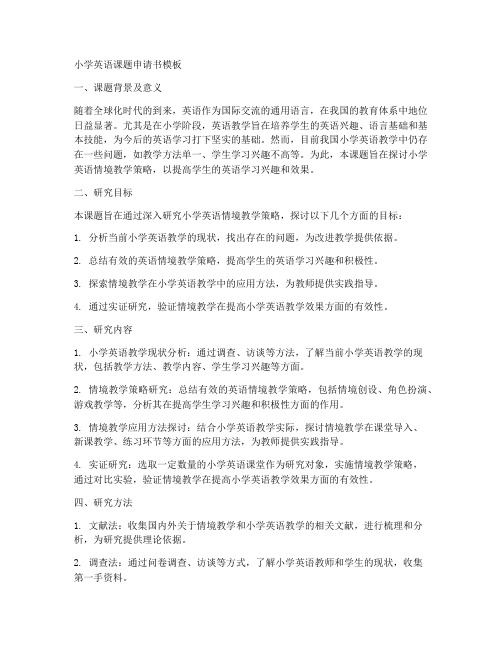
小学英语课题申请书模板一、课题背景及意义随着全球化时代的到来,英语作为国际交流的通用语言,在我国的教育体系中地位日益显著。
尤其是在小学阶段,英语教学旨在培养学生的英语兴趣、语言基础和基本技能,为今后的英语学习打下坚实的基础。
然而,目前我国小学英语教学中仍存在一些问题,如教学方法单一、学生学习兴趣不高等。
为此,本课题旨在探讨小学英语情境教学策略,以提高学生的英语学习兴趣和效果。
二、研究目标本课题旨在通过深入研究小学英语情境教学策略,探讨以下几个方面的目标:1. 分析当前小学英语教学的现状,找出存在的问题,为改进教学提供依据。
2. 总结有效的英语情境教学策略,提高学生的英语学习兴趣和积极性。
3. 探索情境教学在小学英语教学中的应用方法,为教师提供实践指导。
4. 通过实证研究,验证情境教学在提高小学英语教学效果方面的有效性。
三、研究内容1. 小学英语教学现状分析:通过调查、访谈等方法,了解当前小学英语教学的现状,包括教学方法、教学内容、学生学习兴趣等方面。
2. 情境教学策略研究:总结有效的英语情境教学策略,包括情境创设、角色扮演、游戏教学等,分析其在提高学生学习兴趣和积极性方面的作用。
3. 情境教学应用方法探讨:结合小学英语教学实际,探讨情境教学在课堂导入、新课教学、练习环节等方面的应用方法,为教师提供实践指导。
4. 实证研究:选取一定数量的小学英语课堂作为研究对象,实施情境教学策略,通过对比实验,验证情境教学在提高小学英语教学效果方面的有效性。
四、研究方法1. 文献法:收集国内外关于情境教学和小学英语教学的相关文献,进行梳理和分析,为研究提供理论依据。
2. 调查法:通过问卷调查、访谈等方式,了解小学英语教师和学生的现状,收集第一手资料。
3. 实证研究法:在实际教学中运用情境教学策略,通过对比实验,观察和记录学生的学习情况,分析情境教学的效果。
4. 案例分析法:挑选具有代表性的小学英语情境教学案例,进行深入剖析,总结经验教训。
英语课题立项申请书
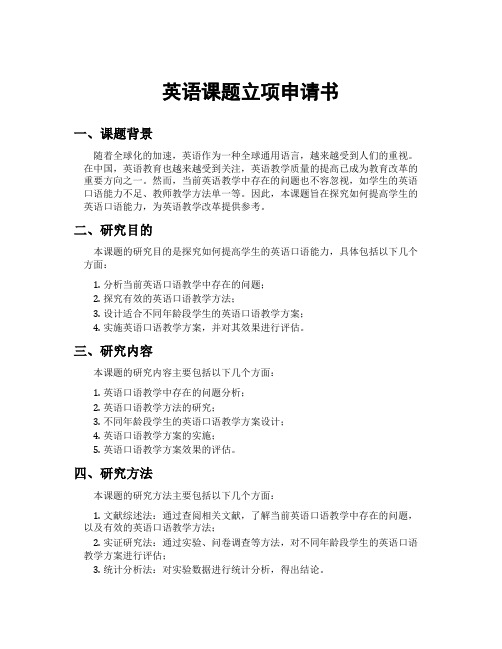
英语课题立项申请书一、课题背景随着全球化的加速,英语作为一种全球通用语言,越来越受到人们的重视。
在中国,英语教育也越来越受到关注,英语教学质量的提高已成为教育改革的重要方向之一。
然而,当前英语教学中存在的问题也不容忽视,如学生的英语口语能力不足、教师教学方法单一等。
因此,本课题旨在探究如何提高学生的英语口语能力,为英语教学改革提供参考。
二、研究目的本课题的研究目的是探究如何提高学生的英语口语能力,具体包括以下几个方面:1.分析当前英语口语教学中存在的问题;2.探究有效的英语口语教学方法;3.设计适合不同年龄段学生的英语口语教学方案;4.实施英语口语教学方案,并对其效果进行评估。
三、研究内容本课题的研究内容主要包括以下几个方面:1.英语口语教学中存在的问题分析;2.英语口语教学方法的研究;3.不同年龄段学生的英语口语教学方案设计;4.英语口语教学方案的实施;5.英语口语教学方案效果的评估。
四、研究方法本课题的研究方法主要包括以下几个方面:1.文献综述法:通过查阅相关文献,了解当前英语口语教学中存在的问题,以及有效的英语口语教学方法;2.实证研究法:通过实验、问卷调查等方法,对不同年龄段学生的英语口语教学方案进行评估;3.统计分析法:对实验数据进行统计分析,得出结论。
五、预期成果本课题的预期成果主要包括以下几个方面:1.发表学术论文:将研究结果发表在相关学术期刊上,为英语教学改革提供参考;2.编写教材:根据研究结果,编写适合不同年龄段学生的英语口语教材;3.推广应用:将研究结果应用于实际教学中,提高学生的英语口语能力。
六、研究计划本课题的研究计划如下:时间研究内容第一年1. 文献综述;2. 英语口语教学方法研究;3. 不同年龄段学生的英语口语教学方案设计第二年1. 英语口语教学方案实施;2. 实验数据收集与分析第三年1. 实验数据分析;2. 结果总结与论文撰写;3. 教材编写七、研究团队本课题的研究团队由以下人员组成:1.课题负责人:XXX,教授,从事英语教学研究多年,具有丰富的教学经验;2.研究人员:XXX,博士生,研究方向为英语教育;3.研究人员:XXX,硕士生,研究方向为英语教育。
英语课题立项申请书范文

英语课题立项申请书范文Proposal for English Curriculum Development Project.1. Project Overview.Project Title: Enhancing English Language Skills Through Immersive Learning Experiences.Project Duration: One academic year (two semesters)。
Target Group: Secondary school students aged 13-16。
Project Aims:1. To improve students' English language proficiency through practical and immersive learning experiences.2. To enhance students' cultural understanding and intercultural communication skills.3. To foster a positive attitude towards language learning and global engagement.2. Project Background.In today's interconnected world, proficiency in English has become a crucial skill for personal and professional success. However, traditional teaching methods often fail to engage students, resulting in a disconnect between learning and real-world applications. This project aims to bridge this gap by incorporating immersive learning experiences into the English curriculum.3. Project Objectives.To design and implement an immersive learning program that integrates English language learning with real-world contexts.To create a curriculum that encourages active participation and collaboration among students.To evaluate the effectiveness of the program through regular assessments and feedback mechanisms.4. Methodology.Curriculum Design:+ Incorporate themes such as global issues, cross-cultural communication, and technology into lesson plans.+ Develop interactive activities and role-plays to simulate real-world scenarios.+ Utilize multimedia resources and technology tools to enhance learning.Immersive Learning Experiences:+ Arrange visits to local businesses and organizations to provide practical language use opportunities.+ Collaborate with other schools or educational institutions to create an international student exchange program.+ Encourage participation in language-related competitions and workshops.Assessment and Feedback:+ Regularly assess students' progress through written assignments, oral presentations, and group projects.+ Collect feedback from students, teachers, and parents to improve the program.5. Expected Outcomes.Significant improvement in students' English proficiency levels.Enhanced cultural awareness and intercultural communication skills.Increased motivation and engagement in language learning.Development of a positive attitude towards global engagement and cross-cultural understanding.6. Resources Required.Funding for program implementation and materials.Access to local businesses and organizations for immersion experiences.Technology tools and multimedia resources for enhanced learning.Collaboration with other schools or educational institutions for exchange programs.7. Implementation Plan.Phase 1 (Month 1-2): Curriculum design and planning.Phase 2 (Month 3-6): Implementation of the immersive learning program.Phase 3 (Month 7-8): Mid-term assessment and feedback collection.Phase 4 (Month 9-12): Continuation of the program with adjustments based on feedback.Phase 5 (End of Year): Final assessment and evaluation of the program's effectiveness.8. Conclusion.By implementing this English curriculum development project, we aim to transform traditional language learning into an engaging and meaningful experience for students. Through immersive learning opportunities, students will not only improve their English proficiency but also gain valuable cross-cultural insights and global perspectives.We believe that this approach will foster a generation of young learners who are not only proficient in English but also passionate about global engagement and cultural exchange.。
英语课题立项申请书
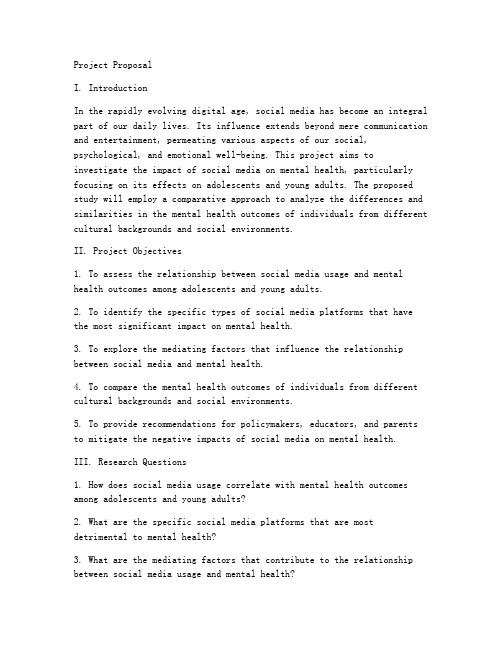
Project ProposalI. IntroductionIn the rapidly evolving digital age, social media has become an integral part of our daily lives. Its influence extends beyond mere communication and entertainment, permeating various aspects of our social, psychological, and emotional well-being. This project aims toinvestigate the impact of social media on mental health, particularly focusing on its effects on adolescents and young adults. The proposed study will employ a comparative approach to analyze the differences and similarities in the mental health outcomes of individuals from different cultural backgrounds and social environments.II. Project Objectives1. To assess the relationship between social media usage and mental health outcomes among adolescents and young adults.2. To identify the specific types of social media platforms that have the most significant impact on mental health.3. To explore the mediating factors that influence the relationship between social media and mental health.4. To compare the mental health outcomes of individuals from different cultural backgrounds and social environments.5. To provide recommendations for policymakers, educators, and parents to mitigate the negative impacts of social media on mental health.III. Research Questions1. How does social media usage correlate with mental health outcomes among adolescents and young adults?2. What are the specific social media platforms that are most detrimental to mental health?3. What are the mediating factors that contribute to the relationship between social media usage and mental health?4. Are there significant differences in mental health outcomes between individuals from different cultural backgrounds and social environments?5. What strategies can be implemented to promote healthier social media usage and improve mental health?IV. MethodologyThis project will employ a mixed-methods approach, combiningquantitative and qualitative research methods to gather comprehensive data. The following methodology will be used:1. Literature Review: An extensive review of existing literature on the impact of social media on mental health will be conducted to identify gaps in current research and to establish a theoretical framework for the proposed study.2. Quantitative Data Collection: A survey will be designed to collect data on social media usage patterns, mental health outcomes, and demographic information from a sample of adolescents and young adults. The survey will be distributed through various online platforms and social media channels to ensure a diverse and representative sample.3. Qualitative Data Collection: In-depth interviews will be conducted with a subset of the survey participants to gain insights into their personal experiences with social media and its impact on their mental health.4. Data Analysis: Quantitative data will be analyzed using statistical software (e.g., SPSS) to identify correlations and trends. Qualitative data will be analyzed using thematic analysis to identify common themes and patterns.V. Expected OutcomesThe proposed study is expected to yield several significant outcomes:1. A better understanding of the relationship between social media usage and mental health outcomes among adolescents and young adults.2. Identification of specific social media platforms that pose a greater risk to mental health.3. Insights into the mediating factors that influence the relationship between social media and mental health.4. Comparative analysis of mental health outcomes across different cultural backgrounds and social environments.5. Recommendations for policymakers, educators, and parents to promote healthier social media usage and improve mental health.VI. BudgetThe budget for this project is estimated to be $50,000, which will cover the following expenses:1. Survey design and distribution: $10,0002. Data analysis software: $5,0003. In-depth interviews: $10,0004. Research assistants: $10,0005. Contingency funds: $5,000VII. ConclusionThis project is designed to shed light on the complex relationship between social media usage and mental health. By exploring this relationship through a comparative lens, we aim to contribute valuable insights to the ongoing discussion on how to mitigate the negative impacts of。
初中英语课题立项申请书
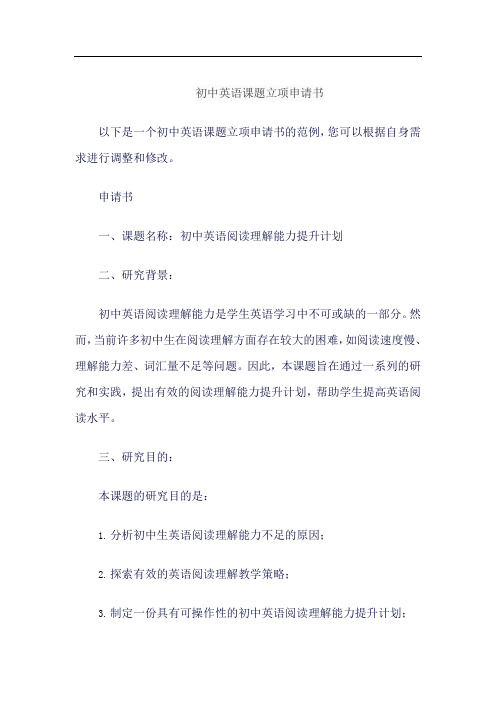
初中英语课题立项申请书
以下是一个初中英语课题立项申请书的范例,您可以根据自身需求进行调整和修改。
申请书
一、课题名称:初中英语阅读理解能力提升计划
二、研究背景:
初中英语阅读理解能力是学生英语学习中不可或缺的一部分。
然而,当前许多初中生在阅读理解方面存在较大的困难,如阅读速度慢、理解能力差、词汇量不足等问题。
因此,本课题旨在通过一系列的研究和实践,提出有效的阅读理解能力提升计划,帮助学生提高英语阅读水平。
三、研究目的:
本课题的研究目的是:
1.分析初中生英语阅读理解能力不足的原因;
2.探索有效的英语阅读理解教学策略;
3.制定一份具有可操作性的初中英语阅读理解能力提升计划;
4.通过实践验证提升计划的可行性和效果。
四、研究方法:
本课题将采用以下研究方法:
1.文献综述:收集与英语阅读理解能力相关的文献资料,了解现有的研究成果和不足之处;
2.调查问卷:对初中生进行英语阅读理解能力的调查,了解学生在阅读理解方面的困难和需求;
3.教学实践:在实践中探索有效的英语阅读理解教学策略,并不断改进提升计划;
4.对比分析:对比实施提升计划前后的学生英语阅读理解成绩,分析提升计划的效果。
五、预期成果:
本课题的预期成果包括:
1.完成一份详细的初中英语阅读理解能力提升计划;
2.通过实践验证提升计划的可行性和效果,为学生提供有效的阅读理解学习指导;
3.为初中英语教师提供实用的教学策略和建议,提高英语阅读理解教学质量;
4.为相关教育部门和科研机构提供有价值的参考数据和研究资料。
英语词汇教校本课题立项申请书
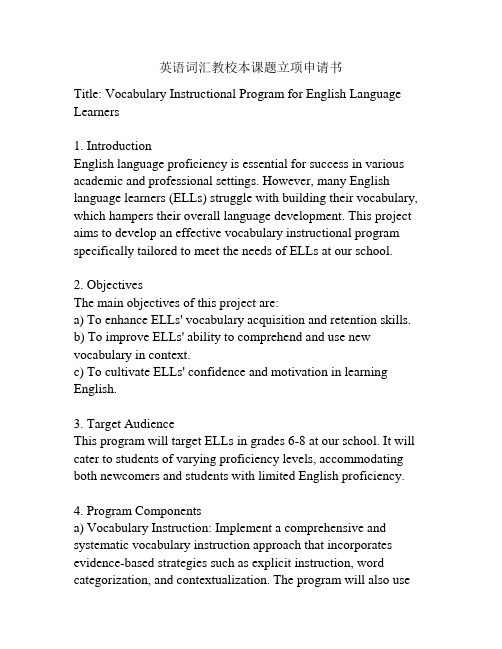
英语词汇教校本课题立项申请书Title: Vocabulary Instructional Program for English Language Learners1. IntroductionEnglish language proficiency is essential for success in various academic and professional settings. However, many English language learners (ELLs) struggle with building their vocabulary, which hampers their overall language development. This project aims to develop an effective vocabulary instructional program specifically tailored to meet the needs of ELLs at our school.2. ObjectivesThe main objectives of this project are:a) To enhance ELLs' vocabulary acquisition and retention skills.b) To improve ELLs' ability to comprehend and use new vocabulary in context.c) To cultivate ELLs' confidence and motivation in learning English.3. Target AudienceThis program will target ELLs in grades 6-8 at our school. It will cater to students of varying proficiency levels, accommodating both newcomers and students with limited English proficiency.4. Program Componentsa) Vocabulary Instruction: Implement a comprehensive and systematic vocabulary instruction approach that incorporates evidence-based strategies such as explicit instruction, word categorization, and contextualization. The program will also usemultimedia resources and technology to engage and reinforce vocabulary learning.b) Vocabulary Practice: Provide regular opportunities for students to practice and apply newly acquired vocabulary through interactive exercises, games, and real-life contexts.c) Vocabulary Assessment: Develop formative and summative assessments to measure students' vocabulary growth and progress accurately.5. TimelineThe proposed timeline for this project is as follows:a) Program Development: Months 1-3b) Pilot Testing and Evaluation: Months 4-6c) Program Refinement: Months 7-8d) Full Implementation: Months 9-126. Evaluation PlanTo ensure the effectiveness of the program, the following evaluation methods will be employed:a) Pre and post-assessments to measure growth in vocabulary knowledge.b) Regular formative assessments to monitor individual student progress.c) Student and teacher feedback surveys to identify areas for improvement.7. Resources RequiredThe successful implementation of this project will require the following resources:a) Development and procurement of instructional materials andresources.b) Training and professional development for teachers to deliver the program effectively.c) Access to technology and multimedia resources.d) Evaluation tools and data collection instruments.8. BudgetAn estimated budget breakdown for this project is as follows:- Instructional materials and resources: $X- Teacher training and professional development: $X- Technology and multimedia resources: $X- Evaluation tools and data collection instruments: $X- Contingency: $X9. ConclusionBy implementing an effective vocabulary instructional program for ELLs, we aim to empower our students with the necessary language skills to succeed academically and socially. This project will foster a supportive learning environment, enabling ELLs to build their vocabulary, improve English language proficiency, and ultimately achieve long-term success.。
教师英语课题立项申请书
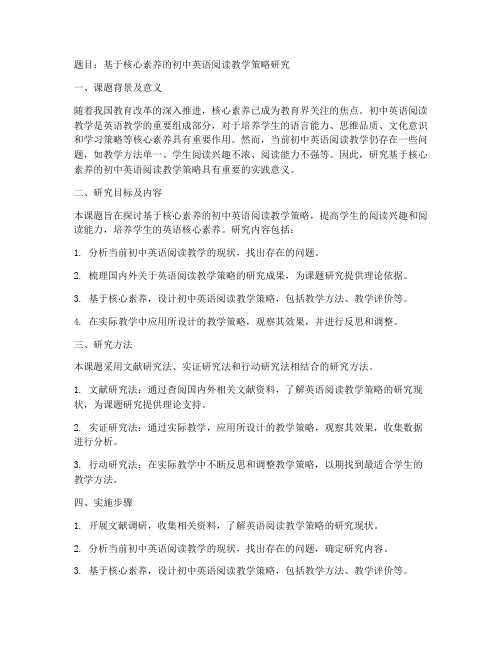
题目:基于核心素养的初中英语阅读教学策略研究一、课题背景及意义随着我国教育改革的深入推进,核心素养已成为教育界关注的焦点。
初中英语阅读教学是英语教学的重要组成部分,对于培养学生的语言能力、思维品质、文化意识和学习策略等核心素养具有重要作用。
然而,当前初中英语阅读教学仍存在一些问题,如教学方法单一、学生阅读兴趣不浓、阅读能力不强等。
因此,研究基于核心素养的初中英语阅读教学策略具有重要的实践意义。
二、研究目标及内容本课题旨在探讨基于核心素养的初中英语阅读教学策略,提高学生的阅读兴趣和阅读能力,培养学生的英语核心素养。
研究内容包括:1. 分析当前初中英语阅读教学的现状,找出存在的问题。
2. 梳理国内外关于英语阅读教学策略的研究成果,为课题研究提供理论依据。
3. 基于核心素养,设计初中英语阅读教学策略,包括教学方法、教学评价等。
4. 在实际教学中应用所设计的教学策略,观察其效果,并进行反思和调整。
三、研究方法本课题采用文献研究法、实证研究法和行动研究法相结合的研究方法。
1. 文献研究法:通过查阅国内外相关文献资料,了解英语阅读教学策略的研究现状,为课题研究提供理论支持。
2. 实证研究法:通过实际教学,应用所设计的教学策略,观察其效果,收集数据进行分析。
3. 行动研究法:在实际教学中不断反思和调整教学策略,以期找到最适合学生的教学方法。
四、实施步骤1. 开展文献调研,收集相关资料,了解英语阅读教学策略的研究现状。
2. 分析当前初中英语阅读教学的现状,找出存在的问题,确定研究内容。
3. 基于核心素养,设计初中英语阅读教学策略,包括教学方法、教学评价等。
4. 在实际教学中应用所设计的教学策略,观察其效果,并进行反思和调整。
5. 总结研究成果,撰写课题研究报告。
五、预期成果通过本课题的研究,预期达到以下成果:1. 分析当前初中英语阅读教学的现状,找出存在的问题,为后续教学改革提供依据。
2. 基于核心素养,设计出适合初中英语阅读教学的有效策略,提高学生的阅读兴趣和阅读能力。
- 1、下载文档前请自行甄别文档内容的完整性,平台不提供额外的编辑、内容补充、找答案等附加服务。
- 2、"仅部分预览"的文档,不可在线预览部分如存在完整性等问题,可反馈申请退款(可完整预览的文档不适用该条件!)。
- 3、如文档侵犯您的权益,请联系客服反馈,我们会尽快为您处理(人工客服工作时间:9:00-18:30)。
黑龙江省教育学会
“十三五”教育科学研究规划课题
立项申请书
课题编号
课题类别
研究领域
课题负责人
申请单位
通讯地址
邮政编码
申请日期
起止年月
说明
一、本申请书所列各项内容均需实事求是,认真填写。
对于课题研究的目的、意义、内容和方法等项目,填写要突出重点、明确严谨、简明扼要。
对课题的预期成果要贴切,体现价值。
二、上报的《课题立项申请书》一式3份,用作省、市教育学会和课题组存档。
三、每项课题负责人不得超过3位,每位负责人限申报一项课题。
每项课题参研人员不得超过30人。
四、此表必须由课题依托学校(专业委员会)负责人签章,并加盖学校(专业委员会)公章。
五、课题研究时限以批准日期为准,研究过程不能低于两年,一般不超过5年。
六、重点课题负责人,一般中学应具有高级专业技术职称、小学应具有中级以上专业技术职称、县(市、区)教育领域的学科带头人及各级教育部门有多年教育行政、业务管理经验的干部。
特殊情况的负责人要在单位审批意见中加以说明。
一、课题研究人员
二、课题设计论证
三、课题负责人近5年取得的与本课题有关的主要研究成果
四、课题所在单位意见
五、市教育学会意见
六、省教育学会学术委员会评审意见。
